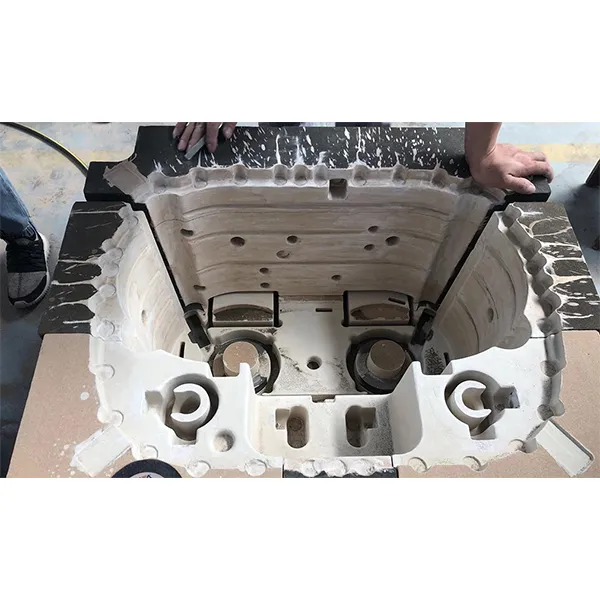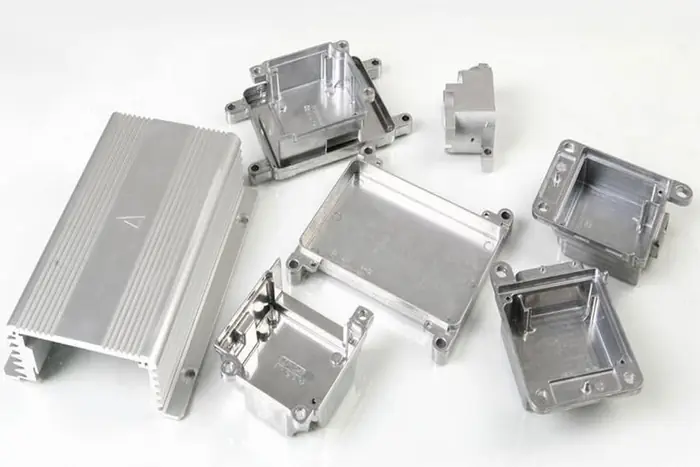Finding an Aluminum Casting Company with professional foundry experience
Discovering the Function of Shop Providers in Advancing Modern Engineering Solutions
Shop solutions are vital fit modern-day design services - Precision aluminum casting. They connect the space in between conventional manufacturing techniques and the demands of contemporary sectors. With developments in automation and sustainability, factories are evolving to meet the requirements of industries such as aerospace and vehicle. This change questions regarding the effects for materials, processes, and future developments. What opportunities and challenges lie ahead for shop solutions in this swiftly changing landscape?
The Development of Shop Services in Design

The integration of computer-aided layout (CAD) and simulation software application has actually reinvented the design and manufacturing procedures, allowing factories to create intricate geometries with greater accuracy. The shift towards environment-friendly practices has led to the adoption of greener innovations and reusing efforts within foundries. As sectors significantly prioritize customization and fast prototyping, foundry solutions have actually broadened their capabilities, ensuring they stay crucial factors to the design landscape. This development emphasizes the factory's critical function in supporting improvements across different industries, including automobile, aerospace, and energy.
Secret Processes and Strategies in Modern Foundries
Modern factories employ a range of crucial procedures and methods that boost the effectiveness and top quality of metal spreading. Amongst these, sand spreading remains widespread as a result of its convenience and cost-effectiveness. Using advanced modern technologies, such as computer-aided style (CAD) and computer-aided production (WEB CAM), enables exact modeling and production, ensuring high precision in component measurements. Furthermore, financial investment spreading is favored for creating complicated geometries with exceptional surface area finishes.
Automation and robotics enhance manufacturing rate and uniformity while reducing labor expenses. Strategies like additive production are progressively integrated to generate detailed mold and mildews and cores, therefore lessening product waste. The application of thermal evaluation help in optimizing spreading procedures by controlling and anticipating solidification actions. Jointly, these methods and processes exemplify how modern shops are adjusting to fulfill the needs of contemporary design obstacles, ensuring exceptional product quality and functional efficiency.
The Significance of Products Choice in Foundry Providers
Selecting the appropriate materials is important in foundry solutions, as it straight influences the mechanical properties, toughness, and total efficiency of the last product. Various products possess distinct features, such as tensile stamina, rust resistance, and thermal stability, which must line up with the designated application of the cast components. Steels like aluminum and steel are often selected for their strength-to-weight ratio, while alloys can boost particular performance qualities.
Moreover, the selection process entails considering factors such as schedule, manufacturability, and price, which can especially affect project timelines and budgets. Furthermore, developments in material science enable the advancement of ingenious compounds and specialized alloys that deal with emerging engineering challenges. Consequently, a detailed understanding of material residential or commercial properties and their ramifications is necessary for designers and foundry professionals to achieve successful results in their jobs. This cautious option process eventually enhances the dependability and efficiency of the end products.
Factory Solutions in Aerospace and Automotive Applications
Foundry services play a vital role in the aerospace and vehicle sectors, where accuracy and performance are critical. These markets depend greatly on the manufacturing of complex parts that have to meet rigorous high quality criteria and hold up against severe conditions. Foundries provide vital services such as spreading, machining, and finishing, guaranteeing elements are light-weight yet durable, necessary for improving gas performance and security.
In aerospace, shop services contribute to the manufacturing of turbine blades, engine components, and architectural components, all of which demand high-performance products and elaborate layouts. Likewise, in the automotive market, factories supply engine blocks, framework components, and transmission situations, focusing on toughness and weight decrease.
Advanced factory methods, consisting of additive manufacturing and precision casting, are progressively used to meet the certain demands of these sectors. By offering customized services, factory services assist drive innovation and preserve competitive advantages in the fast-evolving aerospace and automotive landscapes.
Advancements Driven by Shop Capabilities
Various advancements in design are fueled by the innovative abilities of foundry services. These solutions allow the manufacturing of complicated geometries and high-performance products that are vital for modern applications. For example, additive manufacturing, frequently understood as 3D printing, has actually seen significant innovations via factory strategies, permitting the fast prototyping of complex styles. In addition, the capability to cast light-weight alloys has changed sectors such as aerospace and auto, leading to enhanced fuel performance and performance.
Moreover, factories are significantly incorporating clever technologies, such as automation and data analytics, to improve manufacturing efficiency and top quality control. These developments not only lower waste but additionally allow modification at range, meeting the details requirements of clients. By leveraging advanced foundry abilities, engineers can check out new frontiers in product style and functionality, eventually driving progression throughout different fields and establishing a foundation for future advancements.
Future Trends in Factory Providers and Engineering Solutions
The future of shop solutions is formed by emerging fads such as sustainable production methods, which focus on environmental duty. Automation and smart technologies are readied to enhance performance and accuracy, while enhancing customization and adaptability will certainly meet the evolving demands of clients. As these fads develop, they will certainly redefine the landscape of design remedies in the shop sector.
Sustainable Production Practices
As sectors progressively focus on environmental obligation, sustainable production methods within factory solutions are coming to be important to contemporary engineering solutions. These practices concentrate on reducing waste, decreasing energy consumption, and making use of environmentally friendly materials throughout the manufacturing procedure. By applying see this techniques such as reusing scrap metal and enhancing melting processes, shops can especially lower their carbon footprint. Additionally, the adoption of life process assessments enables suppliers to review the ecological effect of their items from creation to disposal. Working together with providers committed to sustainability further boosts the effectiveness of these initiatives. Ultimately, accepting lasting manufacturing not just lines up with international environmental goals yet likewise cultivates technology and competition in the swiftly progressing engineering landscape.
Automation and Smart Technologies
While numerous markets are welcoming technical advancements, factory services are experiencing a considerable transformation via automation and smart innovations. The integration of robotics and automated systems boosts production efficiency, minimizes human error, and accelerates the production process. Smart technologies, such as IoT and AI, make it possible for real-time surveillance and predictive maintenance, which maximize operational efficiency and lessen downtime. These advancements help with data-driven decision-making, enabling shops to react promptly to market needs and improve product quality. Furthermore, automation lowers labor costs and boosts work environment safety by dealing with unsafe tasks. As factory services remain to embrace these developments, they are positioned to redefine design solutions, resulting in raised competitiveness and sustainability in the manufacturing sector.
Personalization and Versatility Fads
Emerging fads in factory services significantly emphasize personalization and versatility to Extra resources meet one-of-a-kind customer needs. This change shows a wider need for tailored design services that adapt to certain job demands and market requirements. Business are investing in sophisticated innovations, such as additive production and electronic modeling, enabling them to generate tailored components effectively and cost-effectively. Because of this, factories are relocating away from one-size-fits-all methods, using clients the capacity to change layouts and materials in real-time. Furthermore, collaboration between engineering groups and shop services is coming to be extra integrated, cultivating innovation and increasing time-to-market. This pattern not just enhances item efficiency yet also sustains sustainability by minimizing waste through accurate manufacturing procedures.
Frequently Asked Concerns
What Are the Typical Expenses Connected With Foundry Services?
Typical expenses connected with factory services consist of product costs, labor costs, tools use costs, and expenses expenses - aluminum casting. These expenditures can vary extensively based on job complexity, quantity, and details requirements of the engineering service included
Exactly how Long Does the Shop Refine Normally Take?
The shop procedure generally takes anywhere from numerous weeks to a couple of months, relying on factors such as intricacy, product requirements, and production quantity, which can considerably influence timelines and total project delivery.
What Industries Benefit A Lot Of From Foundry Providers?
Industries such as vehicle, aerospace, and building and construction advantage considerably from factory solutions. These markets count on accuracy casting and metal manufacture to create complicated elements, improving item efficiency and functional efficiency in their respective applications.
What Certifications Should Factories Have?
Foundries must possess certifications such as ISO 9001 for quality administration, ISO 14001 for ecological administration, and specific sector accreditations like AS9100 for aerospace or IATF 16949 for automotive, making sure compliance and quality control.
Just How Do Foundries Make Certain Quality Control in Their Processes?

Factory services are important in forming modern design services. As design disciplines have actually advanced, the function of foundry services has changed greatly to fulfill developing blog market needs. As sectors significantly prioritize customization and quick prototyping, shop solutions have broadened their capabilities, guaranteeing they continue to be vital factors to the design landscape. As markets significantly prioritize environmental duty, lasting production techniques within factory services are coming to be vital to contemporary engineering options. Additionally, collaboration in between design groups and factory services is ending up being extra integrated, cultivating advancement and increasing time-to-market.